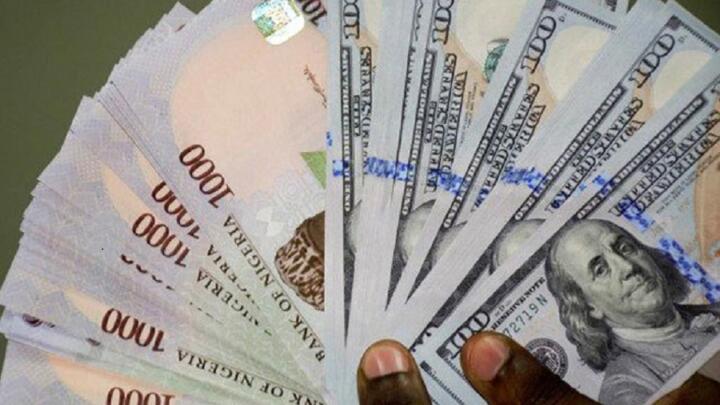The Nigerian naira experienced another dip against the United States dollar at the official foreign exchange window, closing the week at ₦1,532.34/$ despite continued intervention efforts by the Central Bank of Nigeria (CBN). This slight depreciation underscores the persistent volatility facing the nation’s currency amid efforts by the monetary authority to stabilize the foreign exchange market.
At the beginning of the trading week, the naira briefly strengthened, buoyed by reduced demand and improved liquidity. However, that trend was short-lived, as mounting pressures resurfaced, pushing the currency lower against the dollar. Market analysts noted that this decline reflects ongoing structural challenges in Nigeria’s foreign exchange system, where demand continues to outstrip supply, despite consistent efforts by the CBN to bridge the gap.

During the week, the CBN was reported to have injected millions of dollars into the market to meet the demand for foreign exchange, particularly among banks and eligible importers. These interventions, while necessary to moderate volatility, have had limited long-term impact due to the depth of the market deficit and an economy still reliant on imports for basic goods, services, and manufacturing inputs.
The depreciation of the naira also occurred against the backdrop of moderate gains in Nigeria’s external reserves, which rose slightly following an uptick in global crude oil prices. However, the current gains in oil-related revenue have not been sufficient to ease the pressure on the currency, given Nigeria’s large foreign obligations, import dependency, and subdued capital inflows.
Experts say that the naira’s slide despite CBN intervention reflects deeper macroeconomic imbalances that cannot be resolved solely through short-term injections. Nigeria continues to struggle with low export diversification, weak non-oil revenue, and investor hesitancy due to policy uncertainty and inflationary trends. These structural issues continue to weigh on the currency and undermine the central bank’s efforts to establish a stable foreign exchange regime.
In recent months, the CBN has embarked on a number of reforms to unify the exchange rate and encourage transparency in FX transactions. These reforms, though applauded by many stakeholders, are yet to yield significant improvements in the availability of foreign exchange. Traders and businesses remain cautious, often resorting to the parallel market to meet their foreign currency needs when official supply falls short.
Meanwhile, Nigeria’s inflation rate remains high, further exacerbating the situation for the average citizen. The weakening naira contributes to higher prices of imported goods, including essential items such as food, fuel, and pharmaceuticals. Households and small businesses have borne the brunt of the economic strain, and many have called on the government to take urgent steps to boost local production and reduce the economy’s reliance on foreign goods.
The situation is also affecting the investment climate. Potential foreign investors are reportedly wary of bringing capital into a system where currency volatility could erode returns. Many analysts believe that until there is a sustained increase in confidence, capital inflows may remain tepid, further limiting the CBN’s ability to shore up reserves and support the naira.
In the broader economic context, the government has pledged to implement policies that encourage local manufacturing, attract foreign direct investment, and increase export earnings. However, progress on these fronts has been slow, hindered by infrastructure deficits, insecurity in some parts of the country, and bureaucratic bottlenecks that discourage business operations.
The naira’s latest decline also comes at a politically sensitive time. Public sentiment has been increasingly critical of economic policies perceived to be failing to deliver stability and prosperity. In response, government officials and economic planners have called for patience, arguing that structural reforms take time to bear fruit.
Still, there is cautious optimism among some observers that with continued reforms, the situation may gradually improve. The recent upward trend in oil production levels and global oil prices offers some hope of increased foreign exchange inflow. Likewise, initiatives to improve tax collection, expand digital payment infrastructure, and grow the non-oil export sector could, over time, help reduce pressure on the naira.
Market participants are closely watching the CBN’s next moves, especially with the upcoming Monetary Policy Committee meeting. Expectations are mixed: some believe further tightening could stabilize the naira, while others worry it may stifle already weak economic growth. The central bank faces the delicate task of balancing currency stability with broader economic considerations such as inflation control and job creation.
In the meantime, the reality remains stark for many Nigerians. A weakening naira, combined with high inflation and a sluggish economy, continues to erode purchasing power and living standards. As such, the need for urgent and coordinated policy measures—across fiscal, monetary, and trade domains—has never been more critical.
The coming weeks will be pivotal. Whether the naira can find firmer footing or continues its slide will depend not only on central bank interventions but on the broader policy environment and the government’s ability to foster a more resilient, productive, and inclusive economy.
Support InfoStride News' Credible Journalism: Only credible journalism can guarantee a fair, accountable and transparent society, including democracy and government. It involves a lot of efforts and money. We need your support. Click here to Donate
